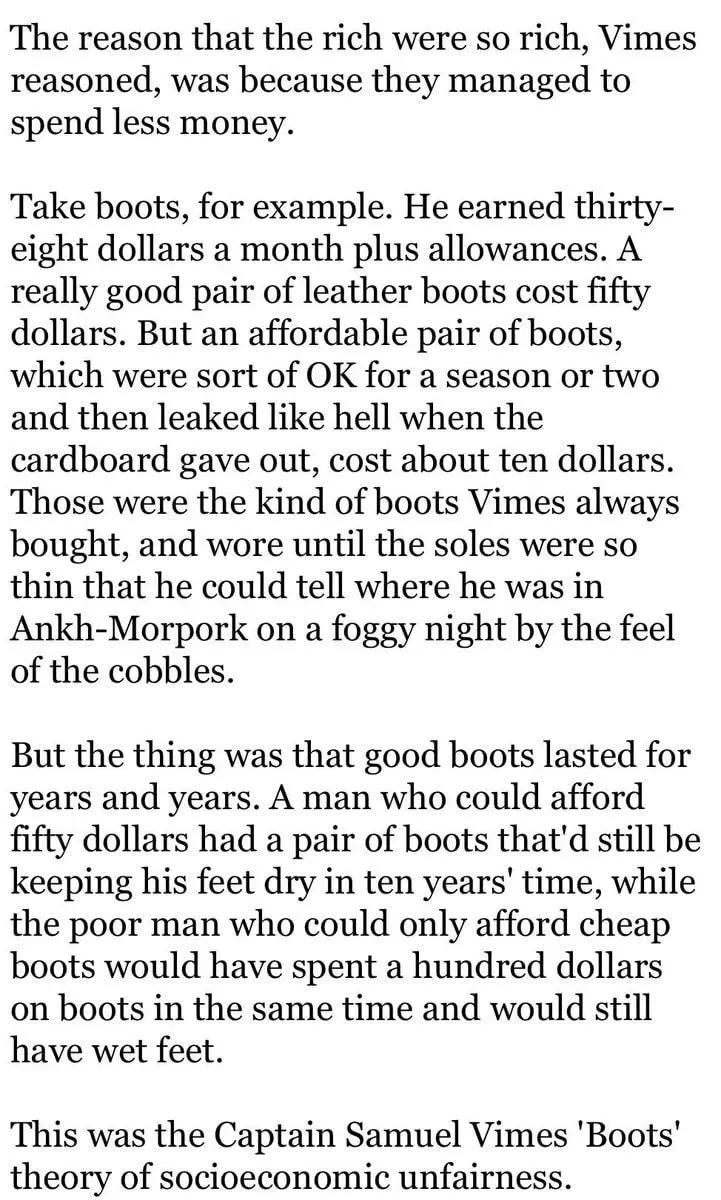Based on the excerpt from this Discworld book, what other items do you use regularly that would fit in this theory? (Boots and shoes are fair game!)
Text transcript for people who want it:
[The reason that the rich were so rich, Vimes reasoned, was because they managed to spend less money.
Take boots, for example. He earned thirty-eight dollars a month plus allowances. A really good pair of leather boots cost fifty dollars. But an affordable pair of boots, which were sort of OK for a season or two and then leaked like hell when the cardboard gave out, cost about ten dollars. Those were the kind of boots Vimes always bought, and wore until the soles were so thin that he could tell where he was in Ankh-Morpork on a foggy night by the feel of the cobbles.
But the thing was that good boots lasted for years and years. A man who could afford fifty dollars had a pair of boots that'd still be keeping his feet dry in ten years' time, while the poor man who could only afford cheap boots would have spent a hundred dollars on boots in the same time and would still have wet feet.
This was Captain Samuel Vimes 'Boots' theory of socioeconomic unfairness.]
Bonus: suggest ways you can repair/restore your item/other people's items.

@sunshine It's very true. There are ways to break the cycle but being poor often means also not having the time to fix or pick up stuff. I have been living of a low income for years now. I think like 80% percent of the stuff I own has been free or second hand.
Clothes dryer, washing machine, dishwasher, oven, microwave, furniture, clothes etc. etc. Sometimes it's tedious and frustrating.
But I also didn't have to work full time or two jobs just to buy all that crap new.
It means I get to spend money on good shoes for me and the kids. Good mattresses. New clothes for the kids because social pressure dictates it. Food.
The rest I build, repair, trade etc. etc. If this capitalist society collapses I'm fucked, off course.
One of the interesting things about the second -hand market is that really good quality items survive two or three owners even, so someone who is knowledgable about quality items or who takes the time to research before getting things can actually be getting significantly better stuff than someone who is buying new.
That being said, being poor makes it hard to have the time or have the opportunity to learn about what is good vs what is bad quality. And people can get really ripped off by vendors who are selling bad quality but making it seems like good quality.
@Otakat Yes. Sometimes it's very specific. I burned money on items that where damaged beyond repair but looked ok on first glance, or just from a different production run that had terrible quality control.
At the moment, mostly due to inflation, people with better income have discovered the second hand market. Which leads to increased prices at thrift stores and online marketplaces. Sometimes the prices in thrift stores are higher for cheap made in china stuff then getting it new in "dollar shop" like places. It's bizarre.
@sunshine
Being poor is expensive.
@huskypenguin I agree. I think I'm rich in time. That's why I don't think I'm poor. It could al be an illusion. Like most people I'm just one missed paycheck away from serious debt and maybe two from losing the house due to missed rent.
@sunshine
Planned obsolescence is another problem to add to this. I've had coffee makers (thermal fuse won't reset), TVs (logic board and LED backlight), garbage disposals (internal seals), garage door openers (capacitor), and fridges (ice maker) all fail 1-2 months after the warrenty in the past 5 years.
Want to get a serviceable unit with readily available parts? Well you can pay 10x the cost.